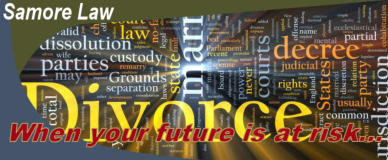

John Samore
Common Legal Questions
Legal Questions & Answers
You may have questions when your future is at risk.
We've collected a number of topics of interest and
common questions with general answers and information
that may be of use. In order to be more detailed, some of
this information is specific to our experience.
Please note that this formation is not legal advice and
does not create an attorney-client relationship. You
should always consult an attorney for individual advice
pertaining to your current or past situation.
General Topics
• Does it make a difference whether I am charged in federal or state courts? • Do judges play favorites or have bias? • If I've done something wrong, can I be found Not Guilty? • Can you have my charges dismissed? • What are "facilitators" and how are they used? • I would like to keep my name and this whole thing out of the newspapers. Can you do this for me?Family Law
• How long will my divorce case take? • How does a court determine if I get alimony or have to pay alimony? • What is the role of hearing officers used by family courts? • How does the Court Clinic in Albuquerque work in deciding how to handle the custody of our children? • What are the costs to get a Divorce? • Can I make my Ex pay for my attorney fees? • I had a baby with this person, and we never got married. Now, he won't pay child support (she won't let me see my child). What can you do for me? • My Ex and I have no fighting issues. We just want someone to draw up the papers. We have a child, but I think we can work that out (We have no kids but worked in the same business). Can you do it cheaply? • What is the difference between joint custody and sole custody? • Can I get a jury to decide my case for custody or divorce? • My spouse says he/she will never give me a divorce. Can they do this? • Can I get an Annulment?Criminal Law
• How do appeals work? • What is the difference between a felony and a misdemeanor? • I have a judge who I hear is very tough on defendants. Can I change judges?Does it make a difference whether I am charged in federal or state courts?
It certainly does. While divorces and child custody cases are always conducted in state court. Criminal cases can be filed in federal court or state court, even for the same acts, because of what the courts call "concurrent jurisdiction." Just because you are charged one court does not mean that a another court could later charge you as well. This is true even for acts arising from one incident. Among many differences, in federal court you have no option to plead "no contest" to a charge. If a person does not plead "guilty," he cannot have the benefit of a negotiated plea agreement and is going to trial. This difference is discussed later in this section under Plea Agreements. The penalties are usually somewhat different under federal law, usually more severe and with less room to try and resolve the conflicts short of a trial. Be sure to share all your concerns with Mr. Samore so you are not surprised as your case develops.Do Judges play favorites or have bias?
Before they were appointed to this important position, Judges were just lawyers like the rest of us. They are always human beings, and all human beings are prone to like certain persons more than others. Judges are supposed to do their level best to remain impartial and be fair to both sides. Sometimes, this can be very difficult. Here is what we tell our clients: Judges are very biased against people who are not truthful. Judges (and juries) tend to deal rather harshly with people who swear to tell the truth and, then, do not. We emphasize to all our clients the huge importance of being honest with the court. We also emphasize the importance of being honest with Mr. Samore. We would rather know the bad, the weaknesses, the flaws in you case first, and deal with those problems in a positive way then be surprised at a trial or hearing.If I've done something wrong, can I be found Not Guilty?
Few things in an attorney’s life give him more joy than to have criminal charges dismissed or hear the blessed words “not guilty” from a jury. Unfortunately, the truth is that many prosecutions result in a guilty plea of some sort; most the time, the charges are greatly reduced. Whether in federal or state court, we shall thoroughly review and protect your rights, if convicted, to be sentenced fairly. The judges will know every fact in your favor.Can you have my charges dismissed?
We have found our clients very much appreciate being treated as adults and treated honestly in these important matters. It is very important to us that we both get off to a good start together. We will always provide an honest assessment about the risks or weaknesses in your case and how much it is likely to cost. You will receive a realistic appraisal of your case and what can be achieved through the legal system. You won't get an unrealistically upbeat, misleading appraisal just to get you to sign up with our office.How do appeals work?
The vast majority of accused citizens wind up being convicted of at least some charge. If by guilty plea, the right to appeal is usually waived. If you are convicted at a trial, you have the right to appeal, and our office has had notable successes on major criminal appeals. As far back as 1983, the Eighth Circuit Court reversed the first conviction under the racketeering law (RICO) in that region due to Mr. Samore’s Brief on Appeal, based upon improper voir dire jury selection. In 2008, Mr. Samore’s diligent trial record led to reversal of a murder conviction, which preserved the violation of the right to confront opposing witnesses. In 2009, after an innocent man had been convicted and was serving a 25-year sentence for sex abuse of his daughter, our office won the first reversal in 40 years on the grounds that the trial court was “clearly erroneous” when it admitted a statement he was alleged to have made to FBI officers. If you believe you have been wrongfully convicted, you know you will get solid representation on appeal here. Even if another attorney did the trial, we can do the appeal. If our trial effort does not result in acquittal, we can continue representation and present your appeal vigorously to the higher court.What is the difference between a felony and a misdemeanor?
The simplest distinction is that a felony means that a state charge subjects the person found guilty to at least one year in prison. A misdemeanor conviction risks up to 364 days in state jail. Both of these penalties can include fines and probation. In federal court, this distinction is much the same, although federal courts no longer use the term "probation" but substitute "supervised release" instead. Many convictions do not require the defendant to go to jail at all, and he or she serves an extended time period when they must comply with conditions of release, whether or not it is called probation or supervised release.I have a judge who I hear is very tough on defendants. Can I change judges?
If you are in a very early stage of your case in state court, New Mexico has a very unique provision that may permit you to exercise the right to excuse the assigned judge and get another judge. Before you do so, you should consult a knowledgeable attorney to see how the process of re-assignment works and whether you might be worse off, instead of better. In federal court (and 49 other state courts), no such right exists. You are stuck with the judge you get, so you better prepare to make the most of it.How long will my divorce case take?
The length of a divorce case varies greatly, depending on how much property, debt, and how to handle minor children. Many other factors develop from those two, and the personalities of the clients and the attorneys is of major influence. Some lawyers like to stir things up and promise their client that they will destroy the other person, but that is very unlikely. We do not try to frighten our clients and encourage a realistic approach. In family courts, the judges usually try to balance the result and divide the assets and debts equally. The problem is that each side may have very different views as to what is fair and balanced. And, if try the case we must, we will eagerly do so, because this attorney loves the excitement of a trial. For the participants, however, a trial is such a gut- wrenching experience, we encourage they consider trying to work out at least some of their differences with their former spouse. Some of the more complicated divorces take several years to complete, and each of the judges in Bernalillo County, for example, have been assigned about 1500 cases. For this reason primarily, most cases settle before trial, but, to get to the point where parties can compromise, they have to exchange a lot of information and go through hearings on particular aspects of the dispute. If they cannot agree and want to go to trial, they may have a wait of many months just to get a judge or hearing officer to listen to the arguments.How does a court determine if I get alimony or have to pay alimony?
The law sets out about twelve factors for the courts to consider in deciding whether an award of alimony or spousal support is appropriate. While the terms are often used interchangeably, alimony and spousal support are different concepts, and the merit of each side's position depends on how facts are developed. Judges vary greatly in how they interpret these factors, so you should have an attorney who understands these issues can present your case most effectively.What is the role of hearing officers used by family courts?
Because of the enormous number of cases judges in some districts have waiting to be heard, courts use "hearing officers," "special commissioners," or similarly termed positions. Some judges have dockets (schedules) that carry well over 1,000 cases and many believe it better to have an independent third person help move the case along and give the parties a notion as to how their dispute will play out. It is hoped this extra step actually gives the parties more information to settle their case and save them the huge cost of a trial. These people are always trained lawyers but are not technically qualified as "judges." They are permitted to hear each side to a dispute and make findings that are reviewed by the judge assigned to the case.Each side has an opportunity to object to any or all of the findings that the hearing officer makes. That review will occur before the judge when each side gets to tell the judge why they differ with the hearing officer's findings. Only after the second hearing (or if there are no objections filed by either party) does the hearing officer's findings become final. The hearing officer usually does not hear all of the case, usually just some aspect of the dispute. for example, in a child custody dispute, the officer will conduct a hearing on temporary primary placement of the child(ren) and award temporary child support be paid. The idea is to get the case moving forward so there are not quite so many issues awaiting the judge if the case finally comes to trial. Having these kinds of hearings also give the parties a chance to see how an impartial third party looks at the conflicts and how the other person actually performs under examination. There is also a chance to test the evidence under oath in this setting and courts can also appoint independent third persons to assist the judge in taking evidence on certain aspects of the case.What are "facilitators" and how are they used?
Facilitators are trained attorneys appointed by the judge or agreed upon by the representing attorneys to hear about the disputes in an informal setting and try to compromise on differences. Usually the facilitator is paid his or her usual hourly rate to work with the parties in a law office around a table, talking to each person and lawyer separately to try and narrow the areas of dispute and broker a settlement of all issues. When these sessions (usually three or four hours long) are successful, everyone leaves with a little less than they might have had if totally successful at trial but with a lot less in legal expenses than if they had pursued their case through the risk at trial. Tension and stress of awaiting a trial and verdict is also avoided.How does the Court Clinic in Albuquerque work in deciding how to handle the custody of our children?
The court clinic is an office with about two dozen psychologists with college degrees who work for the state out of the Bernalillo County Court House. Judges there like to refer disputes regarding child custody at an early stage in the proceedings. The court clinic staff are not authorized to make findings or recommendations for the judge on matters involving child support but are limited to helping the parties at least agree on how to handle child custody and time-sharing while the rest of the case (especially property and debt issues) are being worked. If you and the other parent cannot agree on how to handle the situation, the court clinician may be authorized by agreement between the lawyers and the judge to make what is called and Advisory Consultation. You will have plenty of time to review this report and either agree or object and ask for a hearing on your objections. Costs for services from the clinic are divided between the parents according to income, with the parent making the most money usually paying more. These costs are still a lot less than if a private psychologists were hired. Cases filed in other counties are not able to use this office, which is limited to the First Judicial District. These costs are in addition to your attorney fees and other costs of litigation.What are the costs to get a Divorce?
The Bernalillo Country Courts (Second Judicial District) charges $137 as a fee just for filing, and you will also have to pay to have your spouse served with the Petition for Dissolution of Marriage. If the spouse can be easily found in Bernalillo County, the costs of service should be as low as $30. Each judicial district may set its own filing fee, but this amount is similar. If the spouse is difficult to find or lives far away, the service cost would likely be more. You have to include these costs at the time you retain an attorney, in addition to the attorney's retainer fee. As the case progresses through litigation over time, the expenses of pursuing a just result can increase for example, when child custody is involved, and independent third party may be retained by agreement between the parties to assess which particular aspects of the case and make recommendations to the court; these are also costs you and your spouse will have to share.Can I make my Ex pay for my attorney fees?
This question usually comes up when one person makes a lot more income than the other. For example, the husband is disabled, or the wife has stayed home to focus on care for the children. Most of the time, you will be expected to come up with the retainer and filing fees, and you can seek reimbursement at the end of the case. Judges have the authority to allocate attorney fees incurred between the parties, but there is no guarantee. Good attorneys do not mislead you by blustering that they will get back all the retainer that you have paid. An honest attorney will tell you the truth: maybe "yes," and maybe your share will be equalized in other ways.I had a baby with this person, and we never got married. Now, he won't pay child support (she won't let me see my child).
What can you do for me?
Domestic courts were set up to help you set legal boundaries for exactly such situations. The legal action is filed just the same as the divorce proceedings (see other questions here), except the issues for dividing up property and debts has different ground rules. As far as how you work out the terms for child custody and child support, the rules are almost identical. The costs you can expect to incur are about the same, too.My Ex and I have no fighting issues. We just want someone to draw up the papers. We have a
child, but I think we can work that out (We have no kids but worked in the same business). Can
you do it cheaply?
The truthful answer is "No." The person asking this kind of a question is headed for trouble. The terms of a divorce can effect you the rest of your life. Some attorneys in the state offer divorce services for a few dollars, but, unfortunately, working with an attorney under such circumstances is too often disastrous. A good attorney will tell you the truth: you want it done right the first time-- and that will save you money in the long run! You don't want very important issues not clearly stated, so that you wind up back in court and spend far more money trying to straighten it out. We tell you the truth. We work with you one-on-one. We get it right the first time.











Legal Questions & Answers
You may have questions when your future is at risk.
We've collected a number of topics of interest and
common questions with general answers and
information that may be of use. In order to be more
detailed, some of this information is specific to our
experience.
Please note that this formation is not legal advice
and does not create an attorney-client relationship.
You should always consult an attorney for individual
advice pertaining to your current or past situation.
General Topics
• Does it make a difference whether I am charged in federal or state courts? • Do judges play favorites or have bias? • If I've done something wrong, can I be found Not Guilty? • Can you have my charges dismissed? • What are "facilitators" and how are they used? • I would like to keep my name and this whole thing out of the newspapers. Can you do this for me?Family Law
• How long will my divorce case take? • How does a court determine if I get alimony or have to pay alimony? • What is the role of hearing officers used by family courts? • How does the Court Clinic in Albuquerque work in deciding how to handle the custody of our children? • What are the costs to get a Divorce? • Can I make my Ex pay for my attorney fees? • I had a baby with this person, and we never got married. Now, he won't pay child support (she won't let me see my child). What can you do for me? • My Ex and I have no fighting issues. We just want someone to draw up the papers. We have a child, but I think we can work that out (We have no kids but worked in the same business). Can you do it cheaply? • What is the difference between joint custody and sole custody? • Can I get a jury to decide my case for custody or divorce? • My spouse says he/she will never give me a divorce. Can they do this? • Can I get an Annulment?Criminal Law
• How do appeals work? • What is the difference between a felony and a misdemeanor? • I have a judge who I hear is very tough on defendants. Can I change judges?Does it make a difference whether I am charged in federal or
state courts?
It certainly does. While divorces and child custody cases are always conducted in state court. Criminal cases can be filed in federal court or state court, even for the same acts, because of what the courts call "concurrent jurisdiction." Just because you are charged one court does not mean that a another court could later charge you as well. This is true even for acts arising from one incident. Among many differences, in federal court you have no option to plead "no contest" to a charge. If a person does not plead "guilty," he cannot have the benefit of a negotiated plea agreement and is going to trial. This difference is discussed later in this section under Plea Agreements. The penalties are usually somewhat different under federal law, usually more severe and with less room to try and resolve the conflicts short of a trial. Be sure to share all your concerns with Mr. Samore so you are not surprised as your case develops.Do Judges play favorites or have bias?
Before they were appointed to this important position, Judges were just lawyers like the rest of us. They are always human beings, and all human beings are prone to like certain persons more than others. Judges are supposed to do their level best to remain impartial and be fair to both sides. Sometimes, this can be very difficult. Here is what we tell our clients: Judges are very biased against people who are not truthful. Judges (and juries) tend to deal rather harshly with people who swear to tell the truth and, then, do not. We emphasize to all our clients the huge importance of being honest with the court. We also emphasize the importance of being honest with Mr. Samore. We would rather know the bad, the weaknesses, the flaws in you case first, and deal with those problems in a positive way then be surprised at a trial or hearing.If I've done something wrong, can I be found
Not Guilty?
Few things in an attorney’s life give him more joy than to have criminal charges dismissed or hear the blessed words “not guilty” from a jury. Unfortunately, the truth is that many prosecutions result in a guilty plea of some sort; most the time, the charges are greatly reduced. Whether in federal or state court, we shall thoroughly review and protect your rights, if convicted, to be sentenced fairly. The judges will know every fact in your favor.Can you have my charges dismissed?
We have found our clients very much appreciate being treated as adults and treated honestly in these important matters. It is very important to us that we both get off to a good start together. We will always provide an honest assessment about the risks or weaknesses in your case and how much it is likely to cost. You will receive a realistic appraisal of your case and what can be achieved through the legal system. You won't get an unrealistically upbeat, misleading appraisal just to get you to sign up with our office.How do appeals work?
The vast majority of accused citizens wind up being convicted of at least some charge. If by guilty plea, the right to appeal is usually waived. If you are convicted at a trial, you have the right to appeal, and our office has had notable successes on major criminal appeals. As far back as 1983, the Eighth Circuit Court reversed the first conviction under the racketeering law (RICO) in that region due to Mr. Samore’s Brief on Appeal, based upon improper voir dire jury selection. In 2008, Mr. Samore’s diligent trial record led to reversal of a murder conviction, which preserved the violation of the right to confront opposing witnesses. In 2009, after an innocent man had been convicted and was serving a 25-year sentence for sex abuse of his daughter, our office won the first reversal in 40 years on the grounds that the trial court was “clearly erroneous” when it admitted a statement he was alleged to have made to FBI officers. If you believe you have been wrongfully convicted, you know you will get solid representation on appeal here. Even if another attorney did the trial, we can do the appeal. If our trial effort does not result in acquittal, we can continue representation and present your appeal vigorously to the higher court.What is the difference between a felony and a
misdemeanor?
The simplest distinction is that a felony means that a state charge subjects the person found guilty to at least one year in prison. A misdemeanor conviction risks up to 364 days in state jail. Both of these penalties can include fines and probation. In federal court, this distinction is much the same, although federal courts no longer use the term "probation" but substitute "supervised release" instead. Many convictions do not require the defendant to go to jail at all, and he or she serves an extended time period when they must comply with conditions of release, whether or not it is called probation or supervised release.I have a judge who I hear is very tough on defendants. Can
I change judges?
If you are in a very early stage of your case in state court, New Mexico has a very unique provision that may permit you to exercise the right to excuse the assigned judge and get another judge. Before you do so, you should consult a knowledgeable attorney to see how the process of re-assignment works and whether you might be worse off, instead of better. In federal court (and 49 other state courts), no such right exists. You are stuck with the judge you get, so you better prepare to make the most of it.How long will my divorce case
take?
The length of a divorce case varies greatly, depending on how much property, debt, and how to handle minor children. Many other factors develop from those two, and the personalities of the clients and the attorneys is of major influence. Some lawyers like to stir things up and promise their client that they will destroy the other person, but that is very unlikely. We do not try to frighten our clients and encourage a realistic approach. In family courts, the judges usually try to balance the result and divide the assets and debts equally. The problem is that each side may have very different views as to what is fair and balanced. And, if try the case we must, we will eagerly do so, because this attorney loves the excitement of a trial. For the participants, however, a trial is such a gut-wrenching experience, we encourage they consider trying to work out at least some of their differences with their former spouse. Some of the more complicated divorces take several years to complete, and each of the judges in Bernalillo County, for example, have been assigned about 1500 cases. For this reason primarily, most cases settle before trial, but, to get to the point where parties can compromise, they have to exchange a lot of information and go through hearings on particular aspects of the dispute. If they cannot agree and want to go to trial, they may have a wait of many months just to get a judge or hearing officer to listen to the arguments.How does a court determine if I get alimony or have to pay
alimony?
The law sets out about twelve factors for the courts to consider in deciding whether an award of alimony or spousal support is appropriate. While the terms are often used interchangeably, alimony and spousal support are different concepts, and the merit of each side's position depends on how facts are developed. Judges vary greatly in how they interpret these factors, so you should have an attorney who understands these issues can present your case most effectively.What is the role of hearing
officers used by family
courts?
Because of the enormous number of cases judges in some districts have waiting to be heard, courts use "hearing officers," "special commissioners," or similarly termed positions. Some judges have dockets (schedules) that carry well over 1,000 cases and many believe it better to have an independent third person help move the case along and give the parties a notion as to how their dispute will play out. It is hoped this extra step actually gives the parties more information to settle their case and save them the huge cost of a trial. These people are always trained lawyers but are not technically qualified as "judges." They are permitted to hear each side to a dispute and make findings that are reviewed by the judge assigned to the case.Each side has an opportunity to object to any or all of the findings that the hearing officer makes. That review will occur before the judge when each side gets to tell the judge why they differ with the hearing officer's findings. Only after the second hearing (or if there are no objections filed by either party) does the hearing officer's findings become final. The hearing officer usually does not hear all of the case, usually just some aspect of the dispute. for example, in a child custody dispute, the officer will conduct a hearing on temporary primary placement of the child(ren) and award temporary child support be paid. The idea is to get the case moving forward so there are not quite so many issues awaiting the judge if the case finally comes to trial. Having these kinds of hearings also give the parties a chance to see how an impartial third party looks at the conflicts and how the other person actually performs under examination. There is also a chance to test the evidence under oath in this setting and courts can also appoint independent third persons to assist the judge in taking evidence on certain aspects of the case.What are "facilitators" and how are they used?
Facilitators are trained attorneys appointed by the judge or agreed upon by the representing attorneys to hear about the disputes in an informal setting and try to compromise on differences. Usually the facilitator is paid his or her usual hourly rate to work with the parties in a law office around a table, talking to each person and lawyer separately to try and narrow the areas of dispute and broker a settlement of all issues. When these sessions (usually three or four hours long) are successful, everyone leaves with a little less than they might have had if totally successful at trial but with a lot less in legal expenses than if they had pursued their case through the risk at trial. Tension and stress of awaiting a trial and verdict is also avoided.How does the Court Clinic in Albuquerque work in deciding
how to handle the custody of our children?
The court clinic is an office with about two dozen psychologists with college degrees who work for the state out of the Bernalillo County Court House. Judges there like to refer disputes regarding child custody at an early stage in the proceedings. The court clinic staff are not authorized to make findings or recommendations for the judge on matters involving child support but are limited to helping the parties at least agree on how to handle child custody and time-sharing while the rest of the case (especially property and debt issues) are being worked. If you and the other parent cannot agree on how to handle the situation, the court clinician may be authorized by agreement between the lawyers and the judge to make what is called and Advisory Consultation. You will have plenty of time to review this report and either agree or object and ask for a hearing on your objections. Costs for services from the clinic are divided between the parents according to income, with the parent making the most money usually paying more. These costs are still a lot less than if a private psychologists were hired. Cases filed in other counties are not able to use this office, which is limited to the First Judicial District. These costs are in addition to your attorney fees and other costs of litigation.What are the costs to get a Divorce?
The Bernalillo Country Courts (Second Judicial District) charges $137 as a fee just for filing, and you will also have to pay to have your spouse served with the Petition for Dissolution of Marriage. If the spouse can be easily found in Bernalillo County, the costs of service should be as low as $30. Each judicial district may set its own filing fee, but this amount is similar. If the spouse is difficult to find or lives far away, the service cost would likely be more. You have to include these costs at the time you retain an attorney, in addition to the attorney's retainer fee. As the case progresses through litigation over time, the expenses of pursuing a just result can increase for example, when child custody is involved, and independent third party may be retained by agreement between the parties to assess which particular aspects of the case and make recommendations to the court; these are also costs you and your spouse will have to share.Can I make my Ex pay for my attorney fees?
This question usually comes up when one person makes a lot more income than the other. For example, the husband is disabled, or the wife has stayed home to focus on care for the children. Most of the time, you will be expected to come up with the retainer and filing fees, and you can seek reimbursement at the end of the case. Judges have the authority to allocate attorney fees incurred between the parties, but there is no guarantee. Good attorneys do not mislead you by blustering that they will get back all the retainer that you have paid. An honest attorney will tell you the truth: maybe "yes," and maybe your share will be equalized in other ways.I had a baby with this person, and we never got married.
Now, he won't pay child support (she won't let me see my
child). What can you do for me?
Domestic courts were set up to help you set legal boundaries for exactly such situations. The legal action is filed just the same as the divorce proceedings (see other questions here), except the issues for dividing up property and debts has different ground rules. As far as how you work out the terms for child custody and child support, the rules are almost identical. The costs you can expect to incur are about the same, too.My Ex and I have no fighting issues. We just want someone
to draw up the papers. We have a child, but I think we can
work that out (We have no kids but worked in the same
business). Can you do it cheaply?
The truthful answer is "No." The person asking this kind of a question is headed for trouble. The terms of a divorce can effect you the rest of your life. Some attorneys in the state offer divorce services for a few dollars, but, unfortunately, working with an attorney under such circumstances is too often disastrous. A good attorney will tell you the truth: you want it done right the first time--and that will save you money in the long run! You don't want very important issues not clearly stated, so that you wind up back in court and spend far more money trying to straighten it out. We tell you the truth. We work with you one-on-one. We get it right the first time.






































